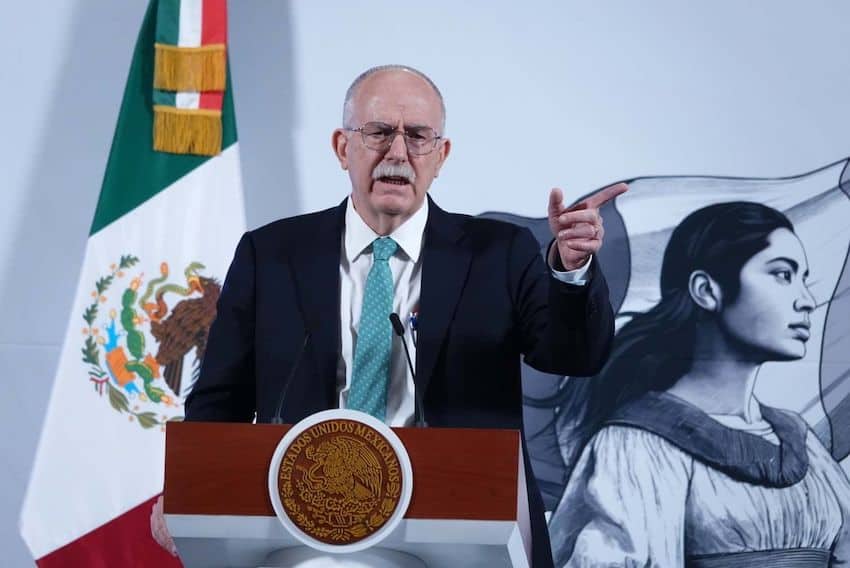The US government said on Monday that it would impose nearly 21% of duties to import most tomatoes from Mexico beginning in July, but the Mexican government hopes to avoid taxation or suspend a contract.
The US Trade Department (Business) announced on Monday that announced “the aim of withdrawal from the 2019 agreement to suspend new tomatoes from Mexico.”
A ReleaseThe department said that stopping the contract is “useful in 90 days.”
“The current agreement failed to protect US tomato breeders from unreasonable prices, because trade has been flooded by the comments that emphasized its dismissal from them. This action will allow the tomato farmers to compete fairly in the market.
“With the termination of the agreement, trade will create an antidamping duty on July 14, 2025, resulting in 20.91% of duties in importing most tomatoes from Mexico,” the department said.
“The implementation of the US trade law is the main center of the Trump administration,” the statement said.
In 2019, in the first term of Donald Trump as US President, The US withdraws from a six -year -old agreement related to tomatoes As a result, in May that year, it was charged 17.5% to import from Mexico.
US Trade Secretary Wilbur Ross said the withdrawal of the withdrawal of Mexican has been reduced following complaints including Florida Tomato Exchange from US tomato manufacturers at the time.
In August 2019, the Mexican Tomato Manufacturers and the US Government Reached a new deal As a result, an anatomizing investigation in the United States suspended and raised 17.5% duties. The United States now wants to stop the deal.
AG Minister: If tomato duties are imposed on salads and ketchup will be more expensive in the United States
Mexican Agriculture Minister Julio Berthekui responded to the US announcement at a press conference on Tuesday morning by President Claudia Shinbam.

Tomato manufacturers in the United States have long been accused of Mexican manufacturers-“In our opinion”-he accused the tomatoes in the United States at the cost of the cost, “This is not true.”
“They have been telling this story for decades,” said Berteku.
He told reporters that five contracts to suspend the antempling investigation in the United States have been reached since 1996.
“It is important to say that 90% of the US imported tomatoes … Mexican tomatoes are important,” said Berteku, “Six of the ten tomatoes they eat”.
The Minister of Agriculture said that the “effect” of approximately 21% of the duties will be the highest tomatoes in the United States if they are destined.
“Their salads, their ketchup, everything (with tomatoes) will be more expensive,” he said.
“They cannot change us because it is not the same as there is a lot of other countries that produce the best tomatoes at the best price,” said Berteku.
“If they want (impose duties), they will pay 21% more than tomatoes,” he said.
Does history occur again?
Berthekui highlighted that there were 90 days until the duties were planned and that Mexico would negotiate with the United States in the meantime.
“They have already done this in 2019, and now, as much as similar,” he said, referring to the US announcement six years ago, withdrawing from the 2013 bilateral tomato agreement.
The United States exits the Mexico Tomato Agreement over farmers’ complaints
Berteku noted that “Mexico defended itself” and that it reached the contract that “it would be valid until now.”
“What’s going to happen now. We are going to start talking … we are going to see how it will change,” he said.
Mexico’s preference is to reach a contract with the United States before the duties are in effect, as in 2019.
Pertegu noted that the US proposed duties on Mexican tomatoes are completely separate from those called Trump’s “mutual fees”.
He also said that the presence of antibiotting investigations is “common”.
“Mexico has two active investigations, not from yesterday, not from yesterday,” said Berteku, one is focusing on importing poultry from the United States, and the other explores that pork is imported from the United States.
He noted that Mexico did not impose any fee for imported products.
In the final comments, Bertek reiterated that Mexico will negotiate with the United States in the next 90 days, which will renew the 2019 contract that the US wants to stop.
“There are hundreds of thousands of people working in tomatoes in Mexico. We have to take care of them,” he said.
Pertegu said that Mexican tomatoes are “very healthy” and that “circle” will not be more expensive for consumers.
Since Trump took office in January, The US has imposed fees Hundreds of products made of Mexican steel and aluminum and those metals and vehicles manufactured in Mexico and Mexican products are not under the USMCA free trade agreement.
Mexico’s tomato exports are all going to the United States
- Mexico produces about 3.6 million tonnes of tomatoes per year and is exported 56% of the total production The Ministry of Mexican Economy (SE) of Mileenio Newspaper report.
- Mileenio has reported that 99.8% of Mexico’s tomato exports will go to the United States, citing SE data.
- The export of Mexico’s new and cold tomatoes made a $ 2.56 billion revenue in 2023, According to SE data.
- Sinalova is the largest tomato production and export state of Mexico. Tomatoes grown in the northern state brought $ 1.06 billion in 2023, or that year, Mexico’s total tomato export was more than 40% of the total tomato export revenue.
- After Sinalova, the next largest tomato exporter states in 2023 are Jalisco, Sonora, Kuanjuado and Puebla.
Mexico news daily








